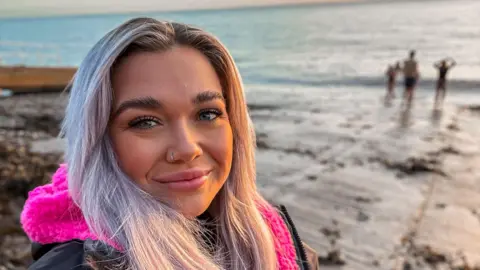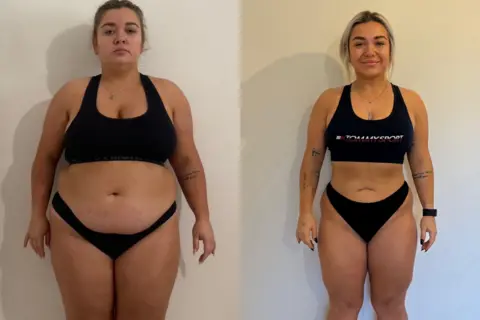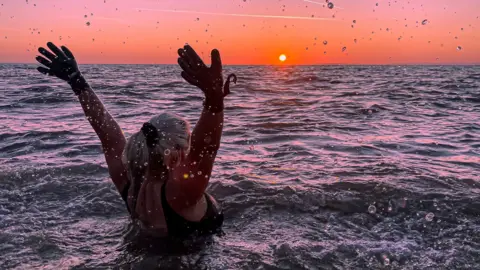 Jessie Hallett
Jessie HallettAfter an 18-hour bender that finished at 9am, the “beer fear and anxiety” got too much, and Jessie Hallett knew she had to quit drinking.
For more than a decade, weeks would go by without a day of sobriety – but now she realised she had a problem, and may not make it to Christmas if she didn’t stop.
New figures from DrinkAware show that 89% of Welsh drinkers are using at least one technique to moderate their drinking.
The statistics show a rise in 18 to 34-year-olds who never binge drink, with more in the Generation Z age group turning to “intermittent sobriety”, where they want to give up drinking, but not completely.
GP Dr Will Mackintosh said while other generations think of alcohol issues as liver disease, which you get much later in life, younger people see the fuller picture of all the associated dangers – such as taking risks and acting impulsively.
“I was burning the candles at both ends, I was working long days and instead of going home after those shifts I would go out after it,” said Jessie, now 29.
“I would drink the next day to avoid the hangover.
“Then all of a sudden weeks go by and you realise you haven’t had a day go by without a drink.”
Jessie, who lives in Cardiff, said she drank socially from a young age, but it’s when she started working in hospitality she noticed her drinking habits changing, going out after shifts finished.
Then the pandemic hit, which made her drinking much worse.
“I was severely depressed at the time, my mental health was in the bin,” she added.
“I was having panic attacks and anxiety and the only way to mask that was through drugs and alcohol.”
Things came to a head on Beaujolais Day 2022 – a French event that toasts the wine harvest every November, that has become popular in Wales.
Jessie said: “I’d gone on a 18 hour bender. I got home at nine in the morning after being out all day.
“The beer fear and anxiety was too much.
“After that moment, I knew. If I hadn’t given up drinking, I wouldn’t have made it to Christmas.”
The next day she told friends and family, and their reaction made her realise she had made the right decision.
“Not one person who was close to me questioned it,” said Jessie.
“That to me was alarm bells, everyone knew that was something I had to do.”
 Jessie Hallett
Jessie HallettAfter almost two years of being sober, her whole life has changed.
“I could never have imagined the life I’m living now. I was really unhealthy when I was drinking,” she said.
“I’ve lost five stone, I go to the gym five or six times a week, I have a new passion for fitness.
“My career has absolutely taken off, I haven’t even had a cold since being sober.”
Jessie runs a social media company and says it’s quite “ironic”, because 90% of her clients are involved with alcohol.
“It empowers me that I can be around booze and the industry and say you don’t have the power over me anymore,” she said.

Non-alcoholic events are becoming popular in the UK, especially with students.
Intermittent sobriety is the new buzz term among Gen Zs who want to give up drinking, but not completely.
Chris Evans, 23, from Aberaeron, Ceredigion, has teamed up with FOR Cardiff to launch the My Drink, My Choice campaign.
It aims to promote alternatives to evening activities centred around drinking, while normalising the decision to avoid alcohol.
“I come from a small town and coming to Cardiff it is easy to get into a culture of drinking alcohol,” Chris said.
“I didn’t even drink much until coming to university, it’s easy to get swept up in it all.”
Although Chris isn’t totally sober, he is aware of why people make the choice not to drink.
“International students who can’t or choose not to drink alcohol didn’t even cross my mind,” he said.
“Events like this gives a chance to give somewhere safe for people to socialise and to be confident to be yourself.”
GP Dr Will Mackintosh, who is based in St Clears, Carmarthenshire, believes younger people have better insight into how alcohol and binge drinking can affect them.
“Traditionally, older people, when they think of alcohol abuse, they think of liver disease,” he said.
“But younger people are more aware of the different harms alcohol can have on you.”
 Jessie Hallett
Jessie HallettJessie’s best advice for anyone wanting to go sober would be to “de-clutter your social media”.
“Fill your feed up with people who inspire you. I still to this day, nearly two years on, take one day at a time,” she said.
“That’s why I still count how many days sober I am, because I don’t know what’s going to happen when I wake up tomorrow.
“But I do know I am going to wake up hangover free.”
If you’ve been affected by the issues in this story, help and support is available via the BBC Action Line.

